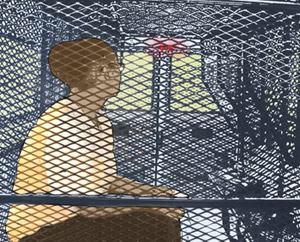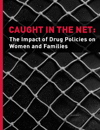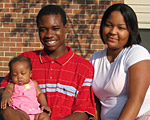|
|
In the last 25 years, the number of women and girls caught in the criminal justice system has skyrocketed; many have been swept up in the "war on drugs" and subject to increasingly punitive sentencing policies for non-violent offenders. There are now more than 200,000 women behind bars and more than one million on probation and parole. Many of these women struggle with substance abuse, mental illness, and histories of physical and sexual abuse. Few get the services they need. The toll on women, girls, and their families is devastating.
Every day, in courtrooms, legislatures, and in the public square, the ACLU fights to ensure that the criminal justice system treats women and girls fairly, that it protects the health and safety of women in its custody, and that it facilitates their successful reentry into their communities.
NEWS AND FEATURES
> RI ACLU Commends Governor's Signage of Anti-Shackling Bill Into Law (6/10/2011)
> Rhode Island Stands Up For Pregnant Women in Prison: Says No to Shackling (6/16/2011)
> Bill Prohibiting Shackling Inmates During Childbirth Unanimously Passes Both Houses (5/13/2011)
> "So, an ACLU Attorney, a Sheriff, and a Pro-Lifer Walk Into a Bar..." (4/29/2011)
> ACLU Settlement Ensures Proper Medical Treatment For Pregnant Mothers In Montana Jail (4/6/2011)
> Virginia Refuses to Unshackle Pregnant Inmates (rhrealitycheck.org, 3/25/2011)
> Long Past Due: Constitution Protects Women in Prison from Unsafe Shackling During Childbirth (rhrealitycheck.org, 10/6/2009)
> Federal Appeals Court Condemns Shackling Of Pregnant Prisoners In Labor (10/2/2009)
> Families Untied: Public Housing Banning Policy Tears Families Apart (8/12/2009)
> Civil Liberties Groups Ask Texas Court To Protect The Rights of Pregnant Women (7/29/2009)
| From Poverty to Prison: Breaking the Chain Over the past three decades, harsh drug laws and increasing arrests for minor, nonviolent offenses have had devastating effects on women and their families, particularly women of color and low-income women.
| Women and Girls Behind Bars Inhumane conditions, abusive practices, and lack of counseling, treatment, and quality health care are common in correctional facilities.
| Barriers to Rebuilding Government and private companies have increasingly imposed post-conviction penalties on girls and women, including numerous barriers to employment, education, and affordable housing that hinder their attempts to rebuild their lives.
|



 > Families Untied: Public Housing Banning Policy Tears Families Apart
> Families Untied: Public Housing Banning Policy Tears Families Apart